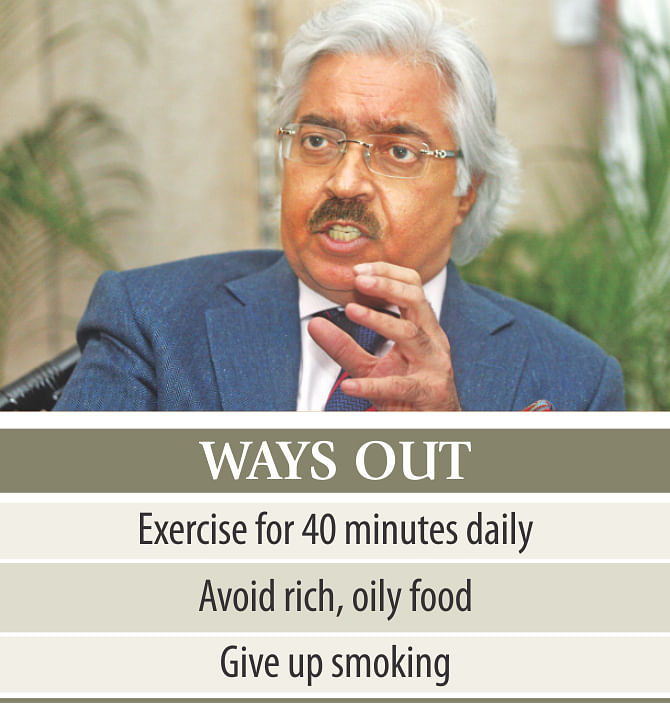Heart diseases now a plague in Bangladesh
Heart diseases now a plague in Bangladesh
Noted Indian cardiologist Dr Ashok Seth tells The Daily Star; attributes the situation to unhealthy lifestyle

Dr Ashok Seth, an acclaimed cardiologist, has expressed deep concerns over the number of people in Bangladesh contracting heart diseases, terming the situation “horrifying”.
“It has already become a plague. The [heart] diseases have overtaken infectious diseases as causes of death in the country. So, we are actually in a frightening situation,” said Dr Seth, chairman of Delhi-based Fortis Escorts Heart Institute.
Seth has performed more than 50,000 angiograms and 20,000 angioplasties over the past 25 years. A lot of his patients were Bangladeshis. The cardiologist also trained many Bangladeshi doctors.
He recently talked to The Daily Star in Dhaka after inaugurating a unit of Fortis Escorts Heart Institute in Khulna aimed at providing high quality cardiac care.
Fortis will manage and operate the 42-bed centre set up by AFC Health Ltd, a concern of Bangladesh-based Active Fine Chemicals Ltd.
According to Dr Seth, coronary heart disease in India, Bangladesh, Pakistan and Sri Lanka has risen by 300 to 400 percent in the last 30 to 40 years, whereas death from the disease has declined by 50 percent in the West.
In India, 10 percent of the population is affected by coronary heart disease, he noted, adding that the number of people, under the age of 40, contracting the diseases has increased by ten times in the last 20 years.
“In Bangladesh, it is even worse. I regularly see young patients from Bangladesh, who are less than forty, who don't smoke or look overweight, but have very bad blockages in their arteries,” he said.
According to medical journal The Lancet, 1.78 lakh deaths were caused by strokes, 1.06 lakh by ischemic heart disease and 28,000 by hypertensive heart disease in 2013 alone in Bangladesh.
Dr Ashok said although India is called the capital of the world's heart disease, he was more worried about Bangladesh as the situation seems worse here. He attributes the situation to bad food habits.
“In Bangladesh, food is too rich and oily, unfortunately even the food cooked at home,” Dr Ashok said and suggested a change in the eating system.
“People's daily diet consists of meat, fried food and polao; sometimes these food are even eaten three times a day -- for breakfast, lunch and dinner.”
He advised all, including those who think themselves to be healthy, to follow three rules: do regular exercise for forty minutes, avoid all oily food and give up smoking.
Dr Ashok suggested enacting laws against trans fat, which is used in making many food items such as cakes and biscuits, but is very harmful to health.
“Awareness about healthy food and lifestyle has to start at school. You cannot change habits when you are old.”
Dr Seth has pioneered numerous angioplasty techniques for India and the Asia-Pacific region. His expertise, skills and pioneering efforts in teaching and training people in angioplasty have won him respect and accolades from all over the world.
He was recently honoured for his contribution to the development of a medicated biodegradable stent and the art of implanting it in blocked arteries to open them up.
After an artery opens in eight months, such stents take two to three years to dissolve, Seth said.
Earlier, the stents were made of metal, and heart patients had to continue medication for thinning blood.
“This advanced science will soon be introduced in Bangladesh,” Dr Seth said, and stressed prevention of such diseases as treatments are not affordable for all.